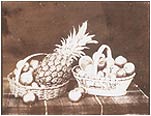|
© Copyright 2003 by the
Photography Criticism CyberArchive. All rights reserved. photocriticism.com |
 |
This printout is for reference only.
Reproduction and distribution of multiple copies prohibited. |
Archive texts:
History of Photography
The Pencil of Nature (1844-46)
Part VI (cont.): PLATE XXIV. A FRUIT PIECE.
THE number of copies which can be taken from a single original photographic picture appears to be almost unlimited, provided that every portion of iodine has been removed from the picture before the copies are made. For if any of it is left, the picture will not bear repeated copying, but gradually fades away. This arises from the chemical fact, that solar light and a minute portion of iodine, acting together (though neither of them separately), are able to decompose the oxide of silver, and to form a colourless iodide of the metal. But supposing this accident to have been guarded against, a very great number of copies can be obtained in succession, so long as great care is taken of the original picture. But being only on paper, it is exposed to various accidents: and should it be casually torn or defaced, of course no more copies can be made. A mischance of this kind having occurred to two plates in our earliest number after many copies had been taken from them, it became necessary to replace them by others; and accordingly the Camera was once more directed to the original objects themselves, and new photographic pictures obtained from them, as a source of supply for future copies. But the circumstances of light and shade and time of day, &c. not altogether corresponding to what they were on a former occasion, a slightly different but not a worse result attended the experiment. From these remarks, however, the difference which exists will easily be accounted for.

For citation purposes, the specific online source for this text is: